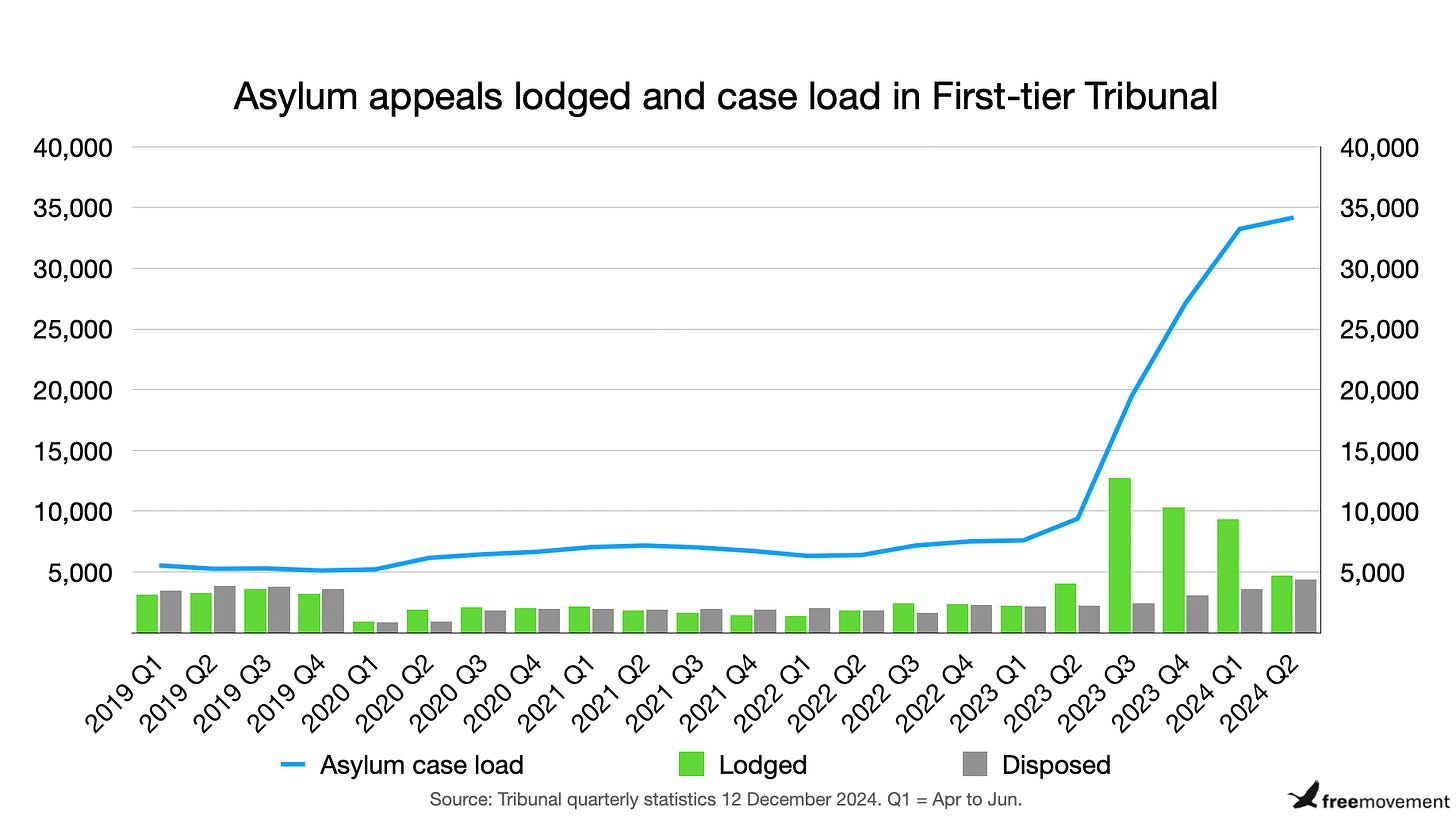Asylum appeals backlog stabilises but waiting times increase by four weeks
And rapidly increasing asylum decisions and a falling grant rate means lots of appeals incoming.
The quarterly tribunal statistics were published this morning. They cover the period June to September, so include the first two months of the new government.
There is a smidgen of good news, as the asylum appeals backlog has barely increased.
The bad news is that the mean waiting time for asylum appeals to be decided increased from 38 weeks for the previous quarter to 42 weeks this time. With around 30,000 asylum claims entering the tribunal system in the last year and a LOT more to come, the asylum accommodation and support costs of that extra delay must be eye-watering. Not as bad as for the initial decision backlog, mind, as we’re talking about a smaller number of people; only those who were refused asylum and lodged an appeal in response to that refusal.
And that’s the really bad news. These statistics only cover the period to the end of September 2024. The new government is thought to have rapidly increased the number of asylum decisions being churned out by officials. And the grant rate has been falling. These two factors combined mean a LOT of asylum refusals. Which in turns means a lot of asylum appeals.
The number of “disposals” managed by the immigration tribunal has risen slightly compared to recent quarters but is still only comparable to before the pandemic. The number of legal aid asylum lawyers has plummeted since then. Many asylum appellants already cannot find a lawyer, and that is before the coming increase in the numbers of appellants. Litigants in person are a nightmare for any judge to deal with and that is even more so with an asylum seeker who does not speak or read English and whose life may depend on the outcome of the case.
The government did recently announce an increase in legal aid rates for taking on asylum appeals but it hasn’t happened yet. It is not clear how far that will merely staunch the haemorrhaging of legal aid lawyers or whether it might increase capacity in the sector. If a large legal aid firm like Duncan Lewis begins to take on appeals again, that would help.* But it is hard to see any increase in rates being sufficient to lure firms back who have moved on to other areas of work completely.
Back in the early 2000s, faced with a similarly large asylum backlog, the then-government was able to rely on two charities, the Immigration Advisory Service and the Refugee Legal Centre, to take on large numbers of appeals. Both charities have since closed, forced out by legal aid cuts. Increasing capacity in the sector is now very hard to accomplish.
I try to be constructive here on this Substack but I’m struggling to see how the new government is really going to be able to deal effectively with the asylum appeals backlog. One concrete thing is to refuse fewer cases, which would mean fewer appeals. But officials seem hell bent on doing the opposite. The grant rate was 75% but is now around 50% and still falling.
The best I can say is that it is a time-limited problem caused by having to process the initial decision backlog left by the last government. There is a large ‘lump’ of appeals. Imagine a snake trying to consume a very large meal. It will take longer than anyone would want. But the problem will, eventually, pass.
* I find myself wondering whether this might then diminish the number of applications for judicial review being brought against the government, given that’s what many immigration legal aid lawyers are doing right now because this work is paid on an hourly rate and a successful outcome means being paid by the losing side at a commercial rate, albeit a low-ish one. Recruiting entirely new lawyers takes time and resources and is a risk. The legal aid rates increase would need to be sufficient to cause firms to reallocate their staff to appeals work. If this did diminish the number of judicial reviews, for example of urgent removals, trafficking decisions and so on, the government would consider this a win-win I guess.






https://theleftlane2024.substack.com/p/starmer-doesnt-challenge-the-rise-b00?